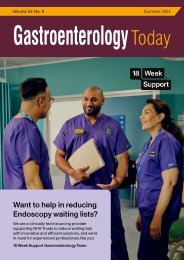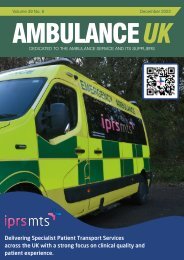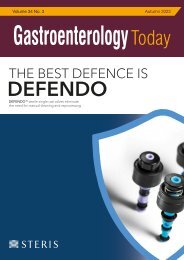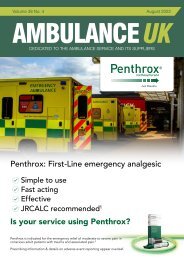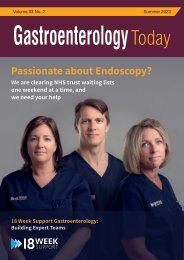Gastroenterology Today Winter 2022
Gastroenterology Today Winter 2022
Gastroenterology Today Winter 2022
You also want an ePaper? Increase the reach of your titles
YUMPU automatically turns print PDFs into web optimized ePapers that Google loves.
FEATURE<br />
after dose 2 included fatigue/malaise (10%), fever/chills (8%), and<br />
headache (8%). Most symptoms resolved in less than 2 days except for<br />
injection site reactions, which mostly resolved within 7 day. Also, it was<br />
reported that 39% of patients suffered from side effects after dose 1,<br />
and 62% after dose 2. The frequency of side effects was similar to the<br />
general population. Also, they found that the frequency of side effects<br />
was less common in individuals receiving biologic therapy, and it more<br />
in those with prior Covid-19. However, they found that side effects<br />
were more common among younger patients, and the massive majority<br />
of adverse effects were non-severe. Severe side effects (defined as<br />
preventing daily activity) were observed in few patients and 3 patients<br />
were hospitalized after dose 1 [17].<br />
Also, Garrido et al. stated that the frequency of side effects was 56.8%<br />
after dose 1 and 74.1% after dose 2. Also, it be lower than general<br />
population during the first week after vaccination. No serious side effects<br />
were reported and all side effects were mild and transitory, and lasted<br />
only a few days without any necessity of patients’ hospitalization. The<br />
percentage of side effects was higher among patients younger than 50<br />
years. However, side effects were reported to be similar in patients with<br />
different sex, vaccine type, biological drug or disease type. They finally<br />
concluded a high acceptance rate and a good safety profile of Covid-19<br />
vaccination in IBD patients treated with biologics, and diverse effects<br />
were common but overall mild and transitory [20].<br />
It was found in Classen et al.’s study that in the IBD group, 58.3%<br />
patients had significantly more side effects after dose 1 compared to<br />
the control group. But, after dose 2, the side effects were higher in<br />
the control group, significantly. The observed side effects after dose 1<br />
were muscle pain, pain at the injection site, and fatigue, which were<br />
not significantly higher in IBD patients than in the control group. Similar<br />
complaints occurred after dose 2 (with pain at the injection site, fatigue,<br />
muscle pain, and fever being the most frequent complaints) [18].<br />
Hadi et al. reported that special adverse events of interest developed<br />
in 2.03% patients with IBD, and in 0.81% patients without IBD. There<br />
was no significant difference in adverse events of special interest and<br />
a new diagnosis of Covid-19 in two groups. Also, it was similar in the<br />
30-day hospitalization after the Covid-19 vaccination, after matching.<br />
No difference was found in steroid prescription at the 1 month follow-up<br />
in vaccinated and unvaccinated patients with IBD in unmatched and<br />
matched analysis. No difference in 30-day adverse events of special<br />
interest after the vaccination between patients with IBD with and without<br />
biologic or immunomodulator use, and also between patients with CD<br />
and UC were found. No difference in steroid use after vaccination was<br />
found between patients with and without biologic or immunomodulator<br />
use, or both, and between patients with CD and UC [21].<br />
Finally, the results of Wong et al.’s study showed that Covid-19<br />
vaccination’s side effect was not different in vaccinated IBD patients<br />
compared vaccinated non-IBD healthcare workers [27].<br />
It is worthy to mention that IBD exacerbation was reported in the Garrido<br />
et al. and Lev-Tzion et al.’s studies [10, 20]. IBD exacerbation was<br />
defined as treatment escalation, commencement of corticosteroids or<br />
enema, or hospitalization. Lev-Tzion et al. found that 44% of vaccinated<br />
and 34% of unvaccinated patients experienced an exacerbation or<br />
treatment escalation, and this difference was statistically significant.<br />
However, the overall risk of exacerbation was 29% in vaccinated<br />
patients and 26% in unvaccinated patients, which was statistically<br />
similar [10].<br />
Costantino et al. reported a value results on Covid-19 vaccine<br />
willingness and hesitancy in Italian IBD patients, as well as the most<br />
common reasons. It was mentioned that lack of data on long-term<br />
safety can reduce vaccine acceptance. They found that 20% of IBD<br />
patients were hesitant or would currently refuse vaccination [30].<br />
The main characteristics of the current systematic scoping review<br />
on IBD patients and Covid-19 vaccination was the simultaneous<br />
comparison of the complications and benefits of various vaccination.<br />
The main limitation of this study was that lack of any clinical trial study,<br />
specially randomized controlled trial.<br />
It was concluded that regardless of the vaccine type, IBD patients that<br />
receiving immunosuppressive drugs need more careful monitoring of<br />
the effects of the vaccine, including screening for antibodies against<br />
the Covid-19 virus, as well as more booster doses. On the other hand,<br />
the concern that exists among patients with IBD about the side effects<br />
of the vaccine was investigated in various studies and it was revealed<br />
that the vaccine does not lead to worsening of the disease and the<br />
side effects are almost the same like other healthy people. According<br />
to existing studies, vaccination has not led to flare of IBD, too.<br />
As a final conclusion, patients with IBD can be advised that vaccination<br />
may have limited minor side effects, but it can protect them from the<br />
serious complications of Covid-19 disease and its resulting mortality<br />
with a high success rate.<br />
Acknowledgements<br />
The authors would like to thank all the healthcare providers who are<br />
fighting the Covid-19 around the world.<br />
Author contributions<br />
ET and MS completed study concept and design. ET, MS, MR, EZ,<br />
and RSM completed acquisition of data. ET, MS, MR, EZ, RSM<br />
finished drafting the manuscript. All authors read and approved the<br />
final manuscript.<br />
Funding<br />
NA.<br />
Availability of data and materials<br />
Data sharing is not applicable to this article.<br />
Declarations<br />
Ethics approval and consent to participate<br />
NA.<br />
Competing interests<br />
The authors declare no competing interests.<br />
Author details<br />
1<br />
Isfahan <strong>Gastroenterology</strong> and Hepatology Research Center, Isfahan<br />
University of Medical Sciences, Isfahan, Iran. 2 Clinical Informationist<br />
GASTROENTEROLOGY TODAY - WINTER <strong>2022</strong><br />
21




